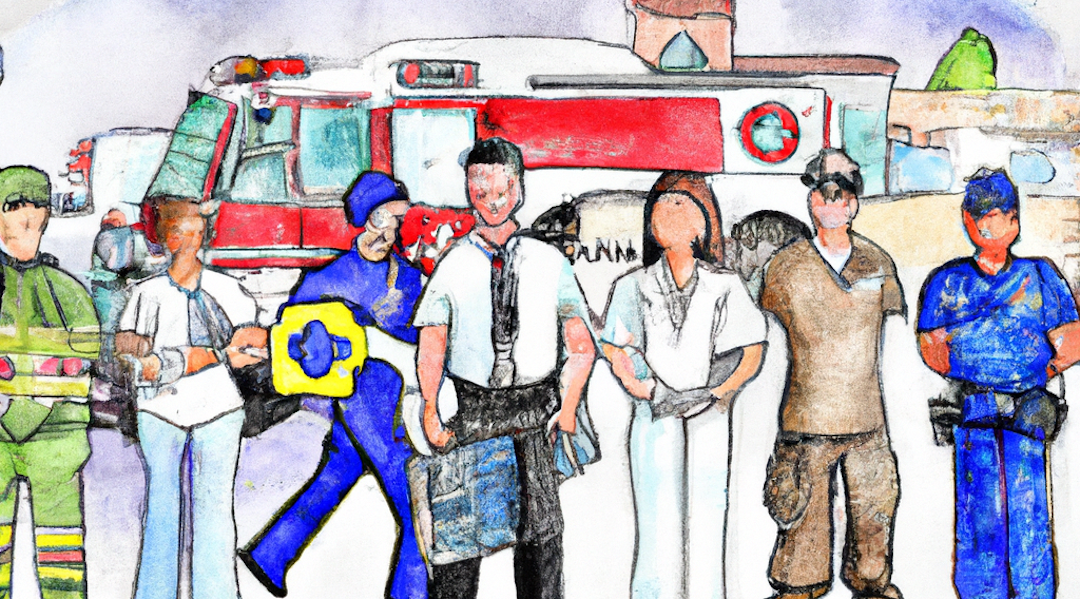(New York Jewish Week) — Trying to get our minds off of the coronavirus, we made the terrible mistake of watching a three-hour adaption of Agatha Christie’s “And Then There Were None.”
Here’s the plot: Ten people are trapped in a grand house on a remote island, where they are stalked by an invisible killer. As one by one the guests meet a gruesome death, the survivors begin to turn on each other and eventually go mad.
At times it felt like a home movie.
I realize how privileged I am (kayn ayin hara) to be even joking about the coronavirus. As I write this, New York has tallied 66,497 positive cases of Covid-19 and more than 1,300 related deaths; in New Jersey, the numbers are 13,386 and 161. Each of these numbers is a person — terrified, sick, dying or dead. Remembering that, the articles about “Free Entertainment to Help You Survive Social Distancing” and “How Not to Tank Your Relationship in Quarantine” begin to feel obscene.
The virus is cleaving society. There are those who are lucky enough to still be working, and to be able to do so from home and follow the distancing directives without much hardship. And then there are those for whom a paycheck means showing up, or whose small businesses will go under, or whose family members need the kinds of care that have become a low priority in the face of the pandemic.
And then there are the nurses and doctors, the ambulance drivers and the paramedics, the firefighters and the policer officers. If we are the home front, then they are on the frontlines, facing a harsh reality that we can only glimpse in videos of mobbed emergency rooms and temporary morgues. Not two miles away, my local hospital has six full floors dedicated to Covid-19 patients — or about 80 percent of the hospital. Its critical care unit declined admissions for non-virus patients, and 20 to 30 health care workers and other staff are under quarantine.
The contrast between my inconvenience and their pitched battle leaves me with something akin to survivor’s guilt. In 2011, Lauren Bailey, a civilian working at the Department of Veterans Affairs, confessed to what she called “civilian guilt” for having sat it out when many of her peers joined up for the military following the September 11 attacks. In her work with veterans, she writes, “I become more ashamed that I did so little while they were out doing so much, and then my shame becomes guilt and then guilt becomes worry that my guilt is overshadowing my gratitude. It’s a vicious cycle.”
I justify myself, not unreasonably, by saying that the best thing I can do for overwhelmed first responders and medical staff is to stay home and healthy, and not risk either getting or spreading the virus. And I am blessed to work at a newspaper, where I can help share the stories of those making real sacrifices and offer ways for others to help them and the vulnerable.
Guilt is of course a very Jewish concept, and a healthy one if it spurs you to repentance and action, as it should (to quote that alleged anti-Semite Voltaire: “Every man is guilty of all the good he did not do”). Come Passover, we reenact the rituals and deprivations of enslavement in part to learn from our own freedom. My friend and teacher Rabbi Eliezer Diamond, a Talmud and rabbinics professor at The Jewish Theological Seminary, put it better in a recent Facebook post about celebrating Passover during a pandemic:
In this moment we are not free. We are subject to a force that eludes our present efforts to halt and defeat it. Some of us will be sick; some will die. Some already have. But we cannot live without hope — not the passive hope that consists of waiting for God to make things whole again, but the hope that translates into action, into doing everything we can to counter this scourge. And let’s take a page out of the Passover playbook. The first Passover reconstituted the Israelite families that had been cruelly torn apart by the dehumanizing forces of slavery. Today we are all one family. Call people you know and people you don’t. Help others in every way you can. Participate in virtual minyanim and other events. We are stronger than we know.
One Monday I listened in on a coronavirus webinar hosted by UJA-Federation of New York, which included advice from Dr. Douglas Nixon, professor of immunology in medicine at Weill Cornell Medical College. Asked what gives him hope, he said, “We have medical science that soon will be able to make that vaccine and come up with those drugs. Our focus is where it should be.” But, he added, science can’t do what charities and volunteers can do, “like distributing [goods and comfort] to vulnerable people who need it.”
I suspect, or at least I hope, that when the outbreak eases it will force a reckoning: with our society’s huge gaps in class and privilege, with a health care system that leaves too many people needlessly vulnerable, with short-sighted policies that favor profits over public health and environmental damage.
In short, many of us may be just “civilians” in this siege, but perhaps it will make us better and more caring citizens.
The New York Jewish Week brings you the stories behind the headlines, keeping you connected to Jewish life in New York. Help sustain the reporting you trust by donating today.






